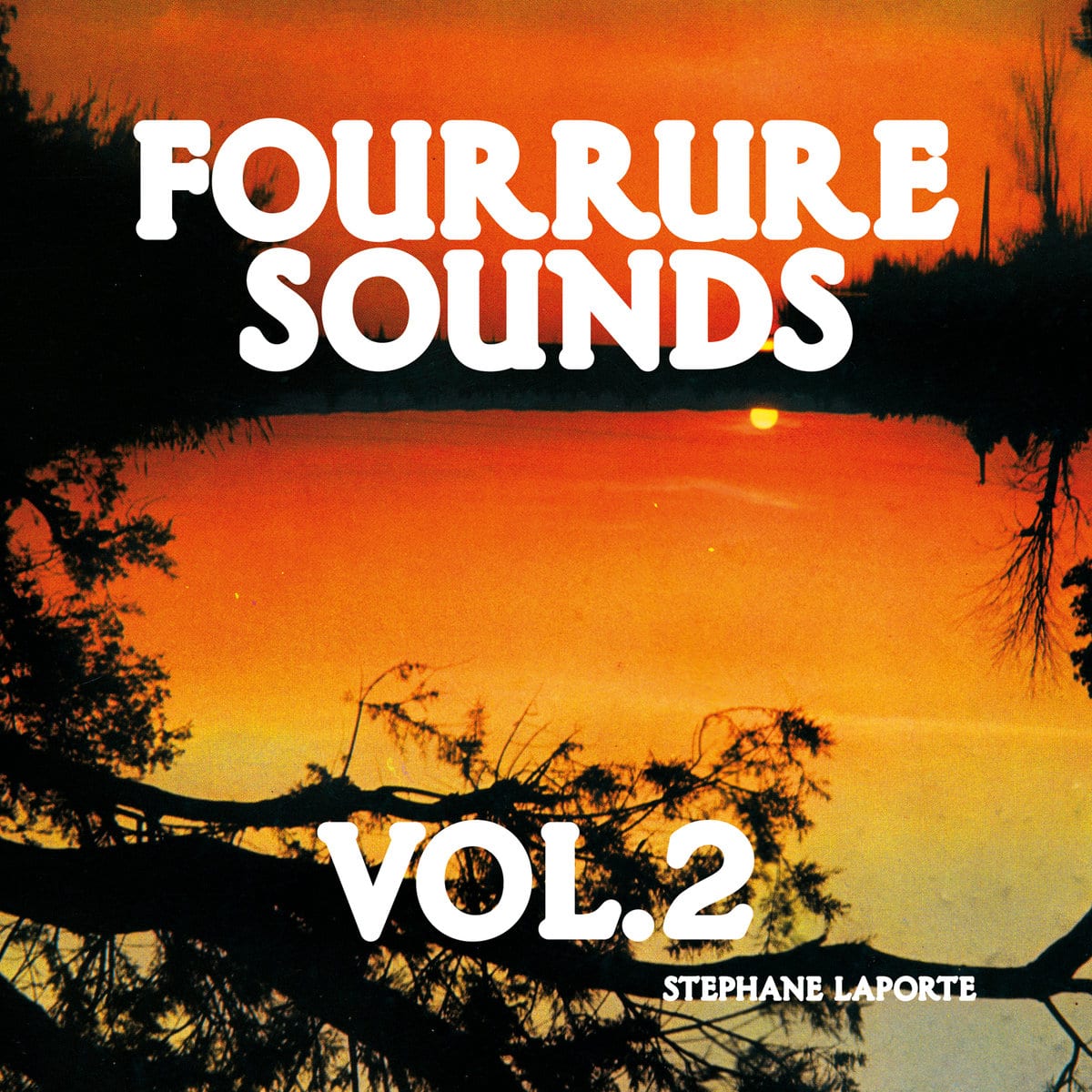
Back in 2014, the discreet Stéphane Laporte made his debut on Parisian touchstone Antinote with the inaugural volume of ‘Fourrure Sounds‘, a fine collection of warped analogue experiments and hallucinated dreamscapes drawing its title from the fur (Fourrure in French) rug upon which Laporte’s machines had been resting during the taping session.
Two years later and Stéphane Laporte makes his longed-for return with the second tome of this sonic epic: unfolding a six-track venture that pushes his intricate hardware explorations to further club-ready spheres with style and nerve yet never sparing unexpected digressions and subtle harmonic shifts.
Initially known for his work as Domotic and other collaborative projects including Egyptology, Centenaire and Karaoke, the French producer isn’t anywhere near the starting point of his career but steps even further out of his comfort zone this time, going for a plain intimate and square-shooting alternative to “classic” dance-music patterns.
We joined forces with Antinote to bring you the exclusive full-stream of the brilliant ‘Fourrure Sounds Vol.2‘ and took the chance to have a talk with the gear-savvy gent about his creative process and other mind-to-machine considerations.
Interviewed by Baptiste Girou
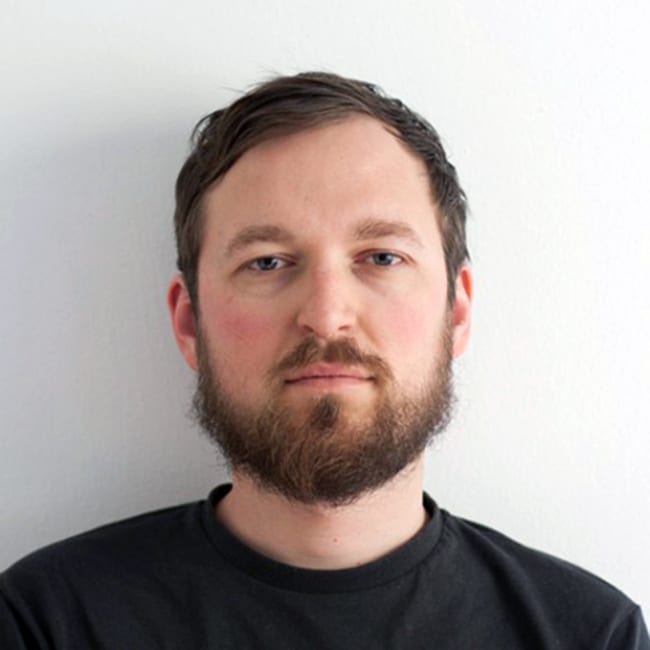
"I started this project as just another thing I would do for fun and for the sake of experimenting something new"
You debuted on Antinote under your real name with the excellent ‘Fourrure Sounds’ two years ago, but you’ve been active as Domotic for a lot longer. What prompted you to switch monikers?
I started this project as just another thing I would do for fun and for the sake of experimenting something new. I work a bit as a sound engineer/producer, and at the time I was really tired of working on music with the computer, polishing and perfecting stuff for myself or for others… then I got a hold of a 4-track cassette recorder that a friend lent me because I recorded an album for him on the machine. It really was a breath of fresh air.
You judge your music trusting only your ears and everything becomes simpler. There’s no waveform to analyse, you can’t quantise anything, you just have to be happy with it or do another take and it’s so cool because I love recording stuff on and on and on until I like it. As a musician you get so much more out of it than when editing together various bits of different takes… so I recorded some stuff in a very spontaneous way when I got my hands on the recorder, put some synth and drum machines and tape echoes around on a fur carpet and spent a couple of days and nights recording stuff on this carpet.
I mixed everything right away, sorted out the good tracks and sent it to a friend who suggested it to Antinote. Quentin wanted to give it another title, both because it was kind of a different approach than Domotic and because he wanted it to be a bit special, not just another Domotic record. I agreed and boom! 2 months later the record was out. I had never done anything so directly and so easily.
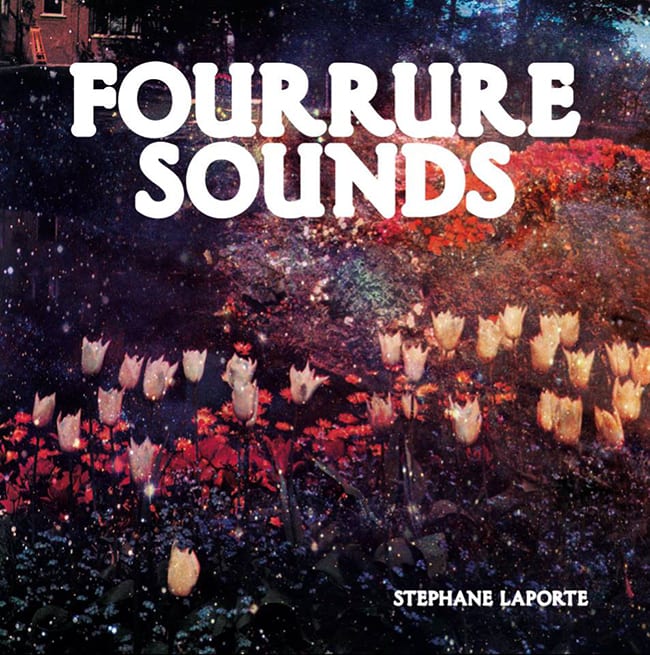
"I would start a song recording like beats or a pulse on the first track - something really open ended, and then improvise and build on top of that"
Do you clearly delineate each sound entity?
It doesn’t really matter but I guess the stuff I’ll do on this recorder will be under the name Stéphane Laporte as I get in a special mindset before doing these.
Please tell us more about that second volume of ‘Fourrure Sounds’ that is coming on Antinote. How and when was it recorded?
The spontaneity in which the first ‘Fourrure Sounds‘ was made, from recording to releasing – really boosted me up, so I went back to making more stuff right away… Also, working with the very direct and fast approach with the 4-track makes it really productive. I would start a song recording like beats or a pulse on the first track – something really open ended, and then improvise and build on top of that.
Once the 4 tracks are full, the song is done and then I start a new one. So every now and then I record music for like 3 days and get around 30 tracks each time. Some good, and some not so good. Some are not even really tracks, more like sound experiments but they’re fun to make anyway.
I kept sending music to Antinote and Quentin started picking some tracks from these various sessions. It took some time because there was so much stuff to listen to… But he’s a really good selector and it turned out he picked the most dancefloor-oriented ones. They come from various sessions, sometimes more than a year apart, but they sort of make sense together.
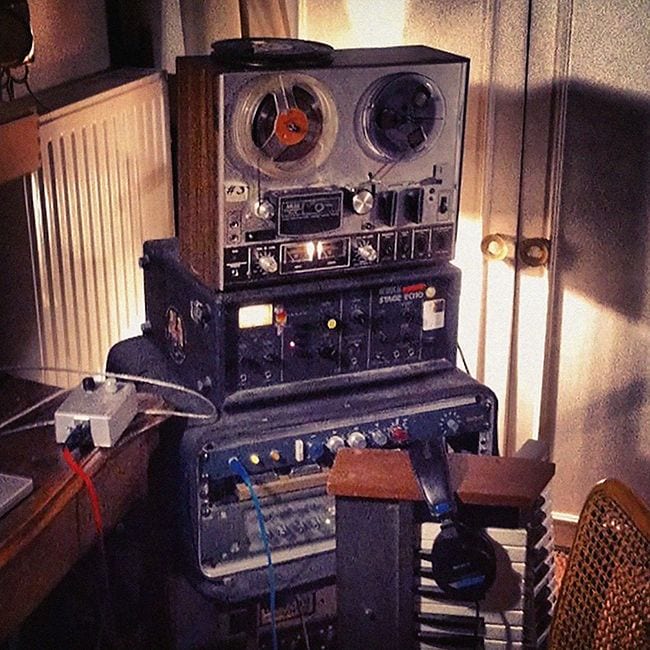
"I have always been interested in the idea of music being repetitive, primitive, simple, radical, trance-inducing...without ever really listening to any techno"
It mixes some breakbeat-inflected, ocean-deep scapes a la Drexciya, AFX-friendly electro-bubbling experiments and retro-laced synth melodies in François De Roubaix electronic works style. Are they musicians you’re familiar with?
Sure, they’re the bosses… I’ve never actually listened to Drexciya at home but I enjoy AFX and De Roubaix’s music a lot. They put their love for sounds, textures and melodies into the music, which makes it interesting to listen to on various levels. I guess they’re not exactly my go-to guys though, perhaps Autechre and Delia Derbyshire come first.
It’s your first incursion into more floor-ready grounds and rhythms. What brought you to this type of music?
Yes, I’m not much of a clubber and don’t really listen to this kind of music, but being on Antinote I thought I’d give this kind of stuff a try. I have always been interested in the idea of music being repetitive, primitive, simple, radical, trance-inducing… without ever really listening to any techno. So I experiment in this direction, but without really having any experience or knowledge or understanding of it. I don’t know the tricks so I guess I have an outsider approach.
Most of the experiments I did with the 808 and SH-101 have been really clumsy though. I always have to put in a melody and the song turns kind of cheesy. Also, as I build the songs from scratch with only one element to build upon, it’s hard to know if your song is going to go in the right direction right from the start. Maybe working with more equipment playing at the same time would be better for this kind of music…
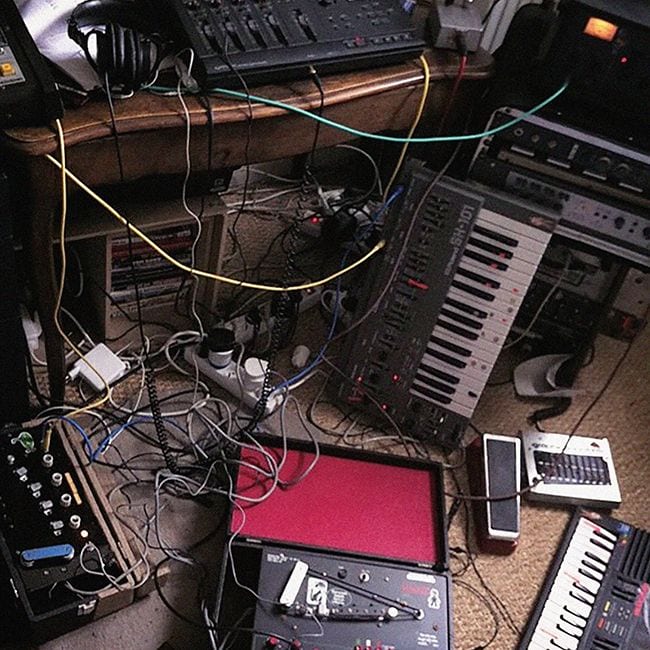
"I’ve wanted to do music since forever, so I thought sound engineering would be a good job"
You played in several bands, like the short-lived Modul. How did the group activity reflect on your solo work?
I’m sure I get a lot of ideas from the musicians I play with, just by exchanging or writing ideas for structures of songs, or learning a new scale, or how people approach sounds. You learn a lot from these experiences definitely but when I’m in a band I mostly try to do other kinds of music than the one I do alone. Be it some pop stuff with Karaoke, when I play some guitar or drums in Centenaire or electronic stuff with Egyptology but it’s way, way more symphonic. A lot of tracks, a lot of sounds combined… so these ideas I get from those projects are kind of filtered again once I try them in Stéphane Laporte because I use different instruments and a different approach.
How did you first get into music production?
I’ve wanted to do music since forever, so I thought sound engineering would be a good job. I got into a cool audio-video school in ’99 and got to use their pro tools. I would go to the faculty at night and make up songs with some samples and an old Yamaha PSS-270 keyboard, without any other ambition than learning how to use the software.
I played these to a friend who knew someone who just started his label, Active Suspension, and we did an EP and then an album with these tracks. After the end of my studies, I started doing more music than engineering, played my first gigs and all, and now I do both.
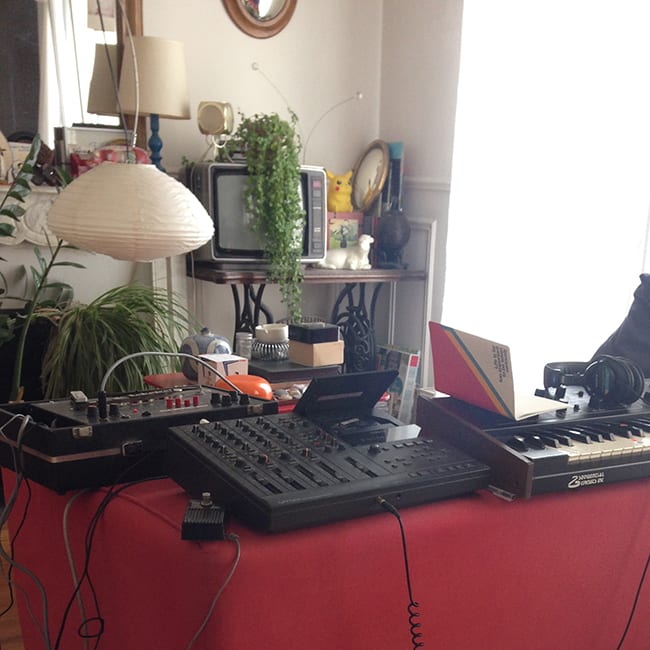
"The machines can be pretty inspiring, you touch a few knobs and then an interesting sound will show up and take you somewhere and you write a song from this sound, you follow it"
Where do you usually draw your inspiration from?
The machines can be pretty inspiring, you touch a few knobs and then an interesting sound will show up and take you somewhere and you write a song from this sound, you follow it. I never start from a pre-written material, like trying to adapt an existing piece of music to this particular setup.
I also try not to repeat myself too much and to change the setup every time I start a new recording session so I don’t get bored. So sometimes you have to think a bit and try to find an interesting way to plug the machines together. Like “Ok let’s use the drum machine as a melodic instrument” and then I’ll plug each of the tom outputs to a different tape echo and make some sort of landscape with that. Then I kind of jam on top of this, I jam some more and sometimes the result is a song, sometimes it’s just boring weird stuff but then I can get another idea from this failure, like a melody or a really cool sound, or a nice drum pattern, and I can try it out on the next song.
Which artists have had the biggest influence on you over the years?
The Beatles, Kraftwerk, This Heat, Autechre, Broadcast are probably the artists I’ve listened to the most and have influenced huge aspects of what I like in music, melodies, electronic sounds, experimentation, rawness, openness…
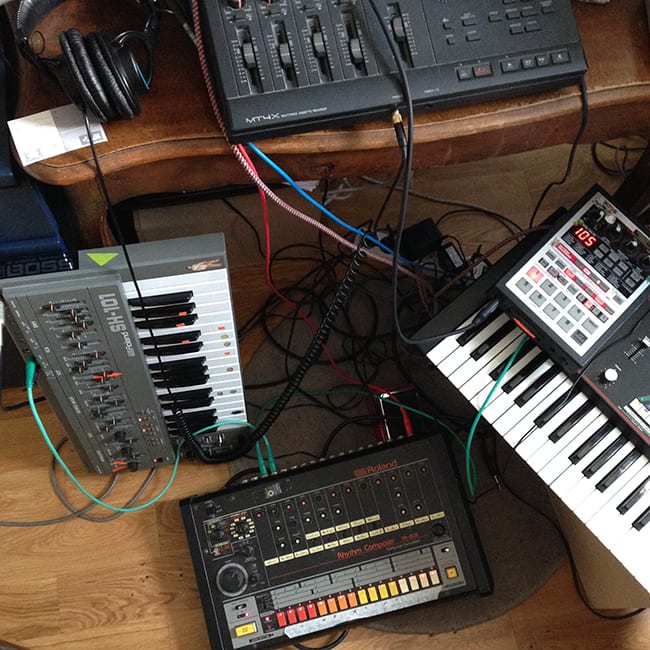
"I love stuff with limited possibilities, simple stuff, almost primitive stuff. No menu, no save"
There’s quite a ‘modular’ aspect to your music, what’s your studio setup comprised of at the moment?
I’ve actually never really played on a modular and I’m not looking to get one. I love stuff with limited possibilities, simple stuff, almost primitive stuff. No menu, no save. So I have a few mono synths like the Roland SH-101, Korg MS-10 and MiniKorg-700s, and I borrow polyphonic stuff from my friends – Prophet 600, Roland JX-3P and I even did one of these sessions using exclusively a Yamaha CS-70.
As for the drum machines, I have a MiniPops and a 808. I also use a lot of tape echoes: Watkins Copycat and Korg Stage Echo, and a Danelectro 9100 for the spring reverb. I use effects before recording so there’s no going back, once a track is heading one way you have to follow it… Then I just record everything into a yamaha 4-track cassette recorder and mix them in the computer with close to no edit and no overdub.
Are you a vintage synth / machines collector?
Kind of, because I have been buying instruments for a long time. I love to get my hands on old stuff with weird or out-of-date functions. You always get new ideas when you first try them out. The last thing I bought was a weird little Yamaha mixing board with built-in drum machine and spring reverb, but I have stopped buying gear for some time because everything is so expensive now.
I can’t afford to buy the machines I dream of, like a Minimoog or a Prophet 5, so now I try to use only what I have – although I’d still love to get a Tascam 388 to record on, but the prices are crazy… It’s this all-in-one reel to reel 8-track recorder with built-in mixer. It would be so cool to have some more tracks, so I could do everything with this, not even use the computer for mixing at all!
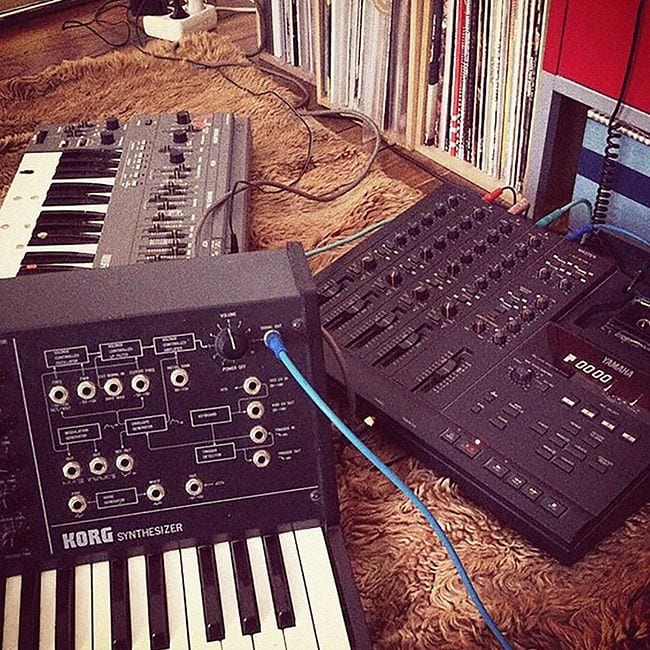
"I do love the studio work. Creatively it’s a slower pace than playing live so you can explore more, there’s no fear of judgement"
What’s the piece of gear you’d never get rid of?
My first love, the roland SH-101. Very simple, very fat and I absolutely love the noise modulation. I have been using it for maybe 12 years and never grew tired of it. The stage echo as well, I use it everyday on almost everything…
Your projects have been mainly studio-focused so far. Do you ever think about putting on a live set?
Yes I do love the studio work. Creatively it’s a slower pace than playing live so you can explore more, there’s no fear of judgement. When working at night, you get these moments where you completely lose track of time… I love this state. But yeah, it’s really hard to reproduce these recordings alone on stage. When I record I do use some sequences and sync the 808 and SH-101 but most of the stuff is played, and there are 4 tracks, so there’s only so much I can do alone and I wouldn’t want to have to perform to a backing track.
I’ve done a couple of solo sets last year, it was pretty fun to do actually, but I did new material for that – stuff that I can play alone, with a lot of improvisation in it and very static pads so there’s only need for beats and bass. I did this with a more simple setup: a DR-110 drum machine, the SH-101 , a Yamaha VSS-200 and a sampler. It’s kind of heavy lifting all this up so I have to figure out a way to make something easier to transport.

"I always try to build longer pieces, drone-like stuff. I would love to be able to make Eliane Radigue-style drones but it’s super hard."
What’s lined up for you next?
I’ll probably borrow another 4-track recorder soon so I’ll have a chance to make new stuff and maybe try to do even more rhythmic stuff with no melody, but it’s so hard to do! I always try to build longer pieces, drone-like stuff. I would love to be able to make Eliane Radigue-style drones but it’s super hard too. I’m waiting for a happy accident. Maybe I’ll also try to record these tracks I did for the live. And then I want to try to play live more.
Fourrure Sounds Vol.2 is released via Antinote on April 26th, pre-order a copy from Bandcamp.
TRACKLIST
1 Border
2 Dispositions
3 Ossature
4 Sound
5 Tunnel
6 Vitre
Discover more about Stéphane Laporte and Antinote on Inverted Audio.
Stéphane LaporteAntinote26 April 2016BreakbeatElectroExperimental